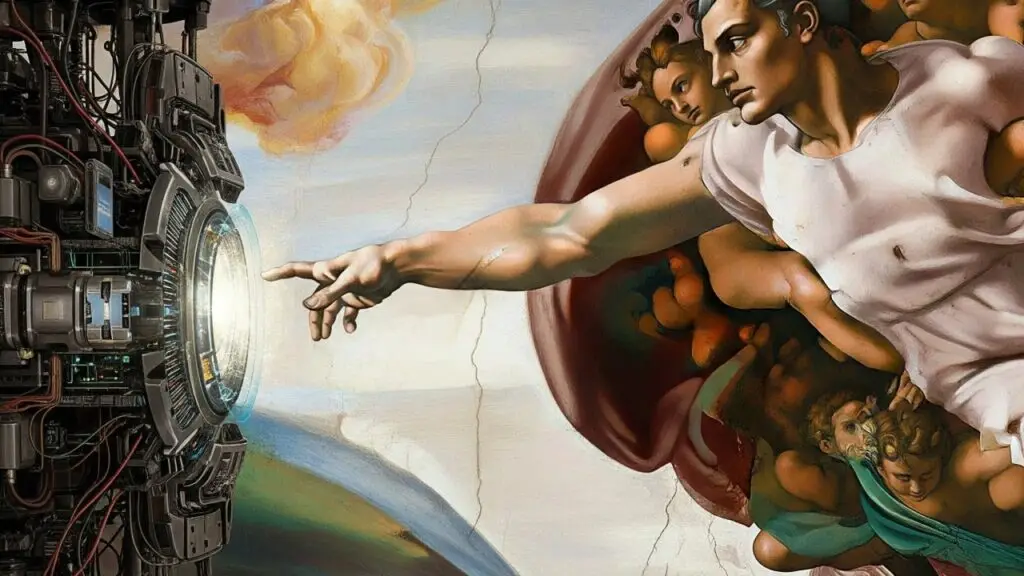The future of life – and learning – is progressively pixelating in my mind. I’m sharing it here not only to creatively articulate it, but to contribute to the social conversation about the impending impact of AI on our lives – and how we prepare our children.
Our brain’s evolutionary impulse is to categorize everything it encounters. This tendency is the basis for memory and the related efficient navigation of our surroundings. It’s also the root of many personal misconceptions and social misunderstandings. Reality, to the extent we can agree on what that even is, tends to resist our binary categorizations: right/wrong, good/bad, us/them, etc. Most things are simply more complex or nuanced. AI is not inherently good or bad—it is rather a mirror and amplifier of human intent. How it evolves, and what it becomes, will be shaped by the values, incentives, and decisions we embed within it. We should resist the temptation to assign moral weight to the tool – and instead take responsibility for how we wield it. As human beings with evolved prefrontal cortexes – and as societies shaped by increasingly sophisticated cultural constructs – we have an obligation to transcend our primitive instinct to generalize and categorize. We’ve all heard a version of the maxim: “To whom much is given, much is expected.” And there’s no denying the intelligence fortune we’ve inherited. Our responsibility as the carriers of consciousness is both to preserve this inheritance – and to grow it.
A Nod to the G.O.A.T.
No serious discussion of AI’s impact on humanity should omit mention of Demis Hassabis, Co-founder and CEO of Google DeepMind. While ChatGPT has dominated headlines since its November 2022 debut, Hassabis and his team have quietly led the charge in applying AI to unlock some of the deepest structures of nature itself. Their breakthroughs are beginning to reshape the boundaries of human understanding – culminating so far in a 2024 Nobel Prize in Chemistry for solving protein folding. Many believe more Nobel-worthy discoveries are imminent. Within the next decade, DeepMind and other AI researchers will radically redefine our entire framework for understanding objective reality – from the quantum field to the cosmos at large. The impact on human life may be without historical parallel.
- While the printing press multiplied access to written ideas, AI multiplies access to thinking itself. It enables near-universal tutoring, translation, code generation, etc.
- What the steam engine did for muscle, AI is doing for mind. It will significantly alter – and potentially entirely replace – knowledge work, and thus the structure of employment, human value creation, etc.
- Like electricity– AI is a general-purpose technology. It is not a product but an enabler – integrated into every system and application, often invisibly but pervasively. It will underpin everything from our personal devices to national security.
- Theinternettransformed communication, commerce, culture, and governance. AI builds atop the internet and automates what we do with all the data it surfaced. If the internet is the Earth’s nervous system, AI is evolving into the Earth’s brain.
Only the Beginning
The Ground of Being
There’s a strong argument to be made that AI’s rise will increase the value of distinctly human experiences: presence, connection, creative expression, being in nature. I wholeheartedly agree. But as a grounding force – not an AI avoidance maneuver. The exponential acceleration of intelligence catalyzed by AI is not a phase, but a phase change. Even so, AI on its own will not determine our human destiny. What will determine it is how we humans integrate AI into our common existential project: the expansion of consciousness. In symbolic terms, the yin of human being needs to be dynamically joined to the yang of accelerated consciousness expansion in the age of AI. Viktor Frankl wrote in Man’s Search for Meaning that ultimately life asks each of us what its meaning is – and we can only answer with the lives we live. My sincere hope is that some who read this will have their visceral AI moment and act to consciously integrate AI in service of navigating – for themselves and their children – the transition to meaning-making in the new age of AI.
“These are wild times. If they don’t seem wild to you, you might be living under a proverbial rock. As wild as it is – get used to it – because it’s going to get much wilder very soon. In fact, this is as normal as it’s going to feel for the foreseeable future.” Ben Mann (Co-Founder of Anthropic)
About the Author
Dan Taylor is currently an evangelist for expanding the role of AI in education and a lifelong student of human potential. He is currently helping scale 2 Hour Learning, a breakthrough school model combining AI-driven mastery-based academics alongside the cultivation of critical life skills.


